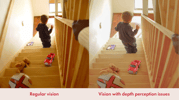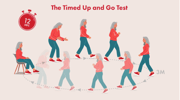
Occupational therapist, the OT Service’s Kate Sheehan, joins our Stannah Collective! In her first blog, Kate builds on our psychologist Jo Hemmings’ scientific link to sleep, exploring the effects of poor sleep on physical, cognitive, and mental health.
It’s essential that we get a good amount of deep sleep and if we have disrupted sleep for even short periods of time it will have a significant effect on our mental, cognitive, and physical well-being since sleep plays a critical role in brain function, which can impact all our bodily systems.
The number of scientists working on sleep research is small but is beginning to develop fast, and it is now acknowledged that quality sleep is as essential as a balanced diet and exercise to maintain healthy lifestyles. Older adults need between seven and eight hours of sleep to function and the adage that you need significantly less than this in later life is a myth.
A good sleeping pattern is a regular one, so going to bed at the same time and turning your light off at the same time each night is as important as waking up at similar times. This allows our bodies to go through the restorative process that sleep provides. Therefore, you will only reap the greatest benefits from sleep when you get enough hours’ sleep each night, have sleep that is relatively uninterrupted and maintain a consistent sleep schedule.
What are the consequences if we do not get the right amount of sleep for our physical, cognitive, and mental well-being?
Physical
Evidence suggests that lack of sleep can have significant physical effects and lead to long-term conditions such as diabetes, obesity, cardiovascular disease, and cancer.
Lack of sleep can lead to increased hypotension as rest time is used by our bodies to regulate the hormones that manage our blood pressure, which can, in turn, put an undue burden on our heart, leading to heart attacks or strokes.
Over a period, sleep deprivation can negatively impact our body’s metabolism and eating habits, which can lead to weight gain, diabetes, and poor self-confidence.
Cognitive
Recent evidence has suggested that those people getting under seven hours’ sleep a night have a greater risk of developing Alzheimer’s; the details of why are still being explored, however, it may be due to amyloid deposits (protein toxins) that accumulate in the brain, killing off cells. During effective sleep, these harmful proteins are effectively cleansed from the brain.
Sleep deprivation can impact a person’s ability to carry out day-to-day activities safely and effectively due to slower reaction times, fatigue, and reduced alertness. Fatigue is a potentially serious problem for older people as it can lead to poor balance, mobility and proprioception which can result in a higher risk of falls.
Mental health
There is a close relationship between sleep and mental health and a poor sleeping pattern can lead to irritability, depression, and anxiety. Once in a cycle of poor sleep, the anxiety to try and sleep then becomes all-consuming and leads to further mental health impacts.
For more guidance on getting a good night’s sleep, read up on the link between sleep, science and mental health in part one of our sleep guide, by Jo Hemmings.
Stay up to date
Latest Blogs

Whole Home Comfort with Stannah and HSL

Dame Zandra Rhodes x Stannah: When accessibility meets style
Could more people benefit from home adaptation support for hidden disabilities?
50 years of Stannah Stairlifts – A milestone grounded in purpose

BBC’s Dr Punam Krishan reveals a little-known Parkinson’s symptom to watch for...

Are you at risk of falling? Dr. Punam Krishan’s simple 12-second test could tell you...

Snore Wars: Could sleeping separately be the secret to a better night’s rest?

Proud to carry the Made in Britain mark!
Stairlifts made for you
All our stairlifts whether straight or curved are customised to suit you and your home so call now to arrange a visit to get your FREE personalised quote!